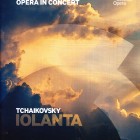Iolanta 2017Scottish Opera
Read more about the opera Iolanta
The 2017/18 season of Scottish Opera continued with a rare performance of Tchaikovsky's last opera. As a follow-up to the four operatic rarities mounted as Sunday concerts in 2016/17, the new subjects are rare Russian works - Tchaikovsky's Iolanta, Prokofiev's Fiery Angel and a Rachmaninov double bill - Aleko and Francesca da Rimini. The fourth of these concerts is a digest of Russian pieces performed by students from the National Opera Studio under the title From Russia With Love.
The idea of presenting a series of Sunday afternoon operatic rarities, introduced last year, has really caught on, attracting a crowded and enthusiastic audience to the Theatre Royal for this opener. A most impressive feature of the enterprise is the extent to which all the performers get involved. These are certainly not concerts, but are acted out with great detail by singers who have all taken the trouble to learn their roles by heart, though with limited likelihood of further performances in future.
New look at Russian work
With Stuart Stratford having trained for three years at St Petersburg under the great Ilya Musin, it was always likely that he would want to strengthen the company's Russian repertoire. With a full-scale Eugene Onegin to come in the Spring a Tchaikovsky taster seemed entirely appropriate to whet the appetite. The orchestra and chorus were on cracking form. The opera is very much in orchestral terms a journey from darkness to light, and there were many moments of gloriously detailed and expressive playing. It all built to a fizzing climax at the end.
The semi-staging, guided by Jack Furness, was confined to the stage front, with all the singers entering from the auditorium sides, while the chorus was divided in the side sections of the grand circle. They all did wonders in communicating the various tensions. The only props used were simple garlands of roses - red and white, of course - draped over the railing of the podium behind the conductor.
Convincing and fresh performance
Of the cast of ten, four were native Russian speakers, Gulnara Shafigullina, also the company's Violetta during the Autumn, is delicately slender in appearance, a good actor with a vibrant voice. She was particularly good at depicting the developing sense of panic as Iolanta begins to realise that she is missing something at her encounter with Vaudémont, a sense that returns more strongly when she can see at last. Tenor Alexey Dolgov is not known in Britain yet, but has already sung Cassio and Lensky at the Met so good things were expected of him. These were largely fulfilled - a bright, youthful tone, with reserves of power as required, and he acted the part with enthusiasm. Their duet is certainly one of the best sections of the opera, and it came over beautifully, as expected, but there is far more to the work than just that.
The part of the king was taken by a Belorussian bass, Alexei Tanovitski. Tall, elegant and expressive, he sang his mournful solos beautifully. The character is difficult to present - his wrong-headed ideas of childcare were eventually overcome easily, as were his plans for Iolanta's marriage - but that is the fault of the libretto by the composer's brother, and this production coped well with them. It was good to see Scottish Opera's new Emerging Artist Alexey Gusev in an important role among such colleagues. He has done excellent work during his years at the Conservatoire in Glasgow, and no-one would have guessed that he has only just finished there.
The British contingent was led by Ashley Holland in a noble interpretation of the Moorish physician. Anne-Marie Owens was welcome back as Iolanta's nurse, and there were excellent contributions from Aled Hall and Nadine Livingstone, as well as from the company's Emerging Artist Laura Zigmantaite - a Lithuanian, so Russian may only have been her second language.
The opera has much remarkable music, as would be expected from such a late work by this composer. Its length has always seemed an issue, but it compares with Salome and Elektra, so should support a whole evening's entertainment. The libretto is far from ideal, not well-paced or structured - but there must be far worse ones in the repertoire. When presented with real conviction, as here, the work does seem to be able to stand on its own.
Performance Cast
- Marthe Iolanta's nurse and Bertrand's wife
- Iolanta King René's blind daughter
- Brigitte Iolanta's friend
- Laure Iolanta's friend
- Bertrand Keeper of the castle
- Alméric King René's armour-bearer
- René King of Provence
- Ibn-Hakia a Moorish physician
- Vaudémont Joffroi, Count Vaudémont, a Burgundian knight
- Robert Duke of Burgundy


